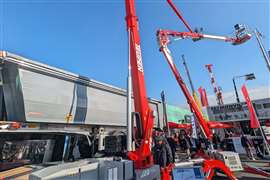FIEC calls for effective implementation
17 March 2017
While acknowledging plans for smart buildings that are described as “ambitious but realistic” in the Energy Performance in Buildings Directive (EPBD), FIEC (the European Construction Industry Federation) said that the implementation of the EPBD must be better this time.
Lennart Henriz, chairman of FIEC’s sub-commission on the environment, TEC-3, said, “While national renovation plans must be more ambitious to achieve the potential energy savings in the EU building stock that we know are possible, the proposed revisions to the EPBD will only have the desired impact if good intentions are matched by effective implementation at national, regional and local level.”
He said, “Furthermore, although we are completely committed to the digitalisation of buildings, we need to work together with the rest of the construction industry and EU policy makers, to determine what we mean by ‘smartness’ and how we will measure this.”
He said there should be “no unrealistic indicators, gimmicky terminology or mandatory use of Energy Performance Certificates, particularly as the latter are not yet reliable or consistent in all countries”.
FIEC said it supported the push for energy renovation of existing buildings, where this could deliver tangible savings and overall improvements to the building.
The proposed revisions to the EPBD are broadly welcomed, it said. However, FIEC insisted that any smartness indicator developed to measure the readiness of buildings to use digital control systems – such as those designed to regulate heating and cooling automatically according to occupation levels and user need – should be coherent in terms of the forthcoming voluntary assessment framework.
This framework has been developed over a period of three years to evaluate the environmental performance of buildings, and FIEC said that any separate indicators resulting from the revised EPBD would be “a nonsense”.
It said that new indicators should also be compatible with existing certification schemes already recognised by the market, such as LEED and BREEAM.
Clean Energy Package
FIEC’s position on the proposal has been published and accompanies its position on the Clean Energy Package.
After the Clean Energy Package was released at the beginning of this week, FIEC President Jean-Louis Marchand said, “FIEC has an important role in the EU-wide effort to achieve the binding target for energy efficiency and we can encourage the renovation of existing buildings, assuming that adequate investment materialises, following the wide-sweeping package of measures, which we broadly support.
“In particular, we are delighted that the European Commission has finally recognised that innovation in the construction sector, albeit currently undergoing a transformational period, is more generally incremental and energy efficiency solutions have long been available, with new technologies emerging all the time.”
FIEC said it was particularly pleased with the collaborative approach taken by EU policy makers to produce a package that was “a result of joined-up thinking, with key initiatives from different Commission directorates referenced in many documents”.
President of FIEC’s Technical Commission Kjetil Tonning said, “In TEC, we have been involved in the development of the voluntary assessment framework on the environmental performance of buildings as well as the Construction & Demolition Waste Protocol, and recent discussions to improve the effectiveness of the Construction Products Regulation.
“All of these are mentioned in the package and we believe that building on what has already been created is exactly what is needed, to avoid unnecessary duplication.”
Collaborative effort
FIEC said it saw its considerable role as part of a huge collaborative effort, which needed the involvement of everyone.
Marchand said, “The construction industry, energy companies, national governments, financial institutions as well as energy consumers, both industrial/commercial and householders need to get behind this package.
“Together, we can ensure that we tackle the problem of energy waste, to give the EU the best possible chance of eliminating once and for all the over-reliance on energy imports and the risk of energy shortages in future, which threaten the European economy and the well-being of our citizens.”
He added that it was clear that contractors were major players in the delivery of this package.
“We call on the EU policy makers to ensure that we are adequately represented at all fora established to ensure the successful implementation of the various measures proposed in the Clean Energy Package. Contractors and the rest of the construction sector make up the solution industry in this enormous Europe-wide taskforce”.






